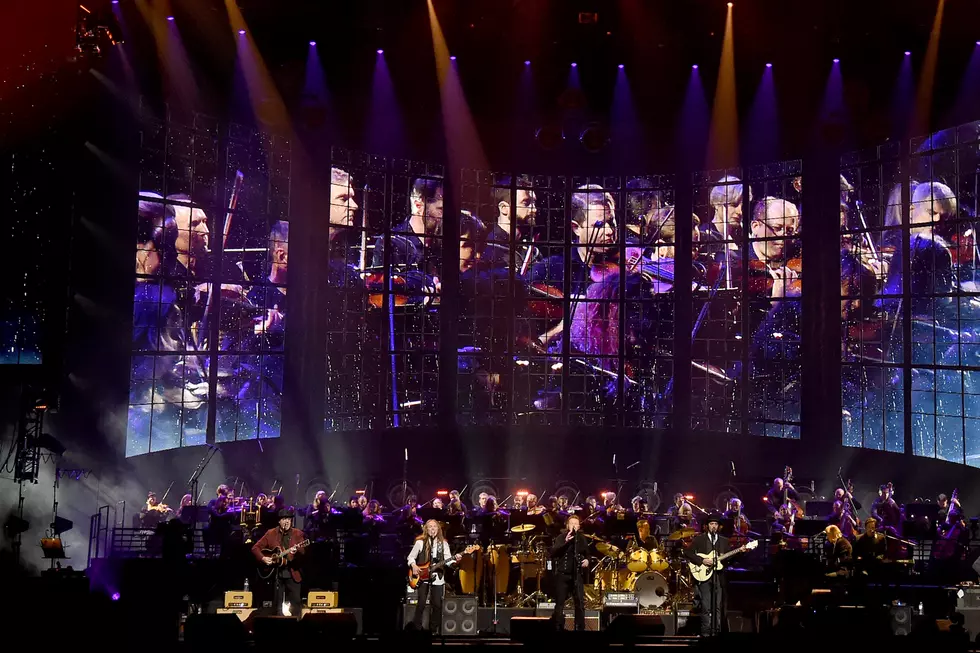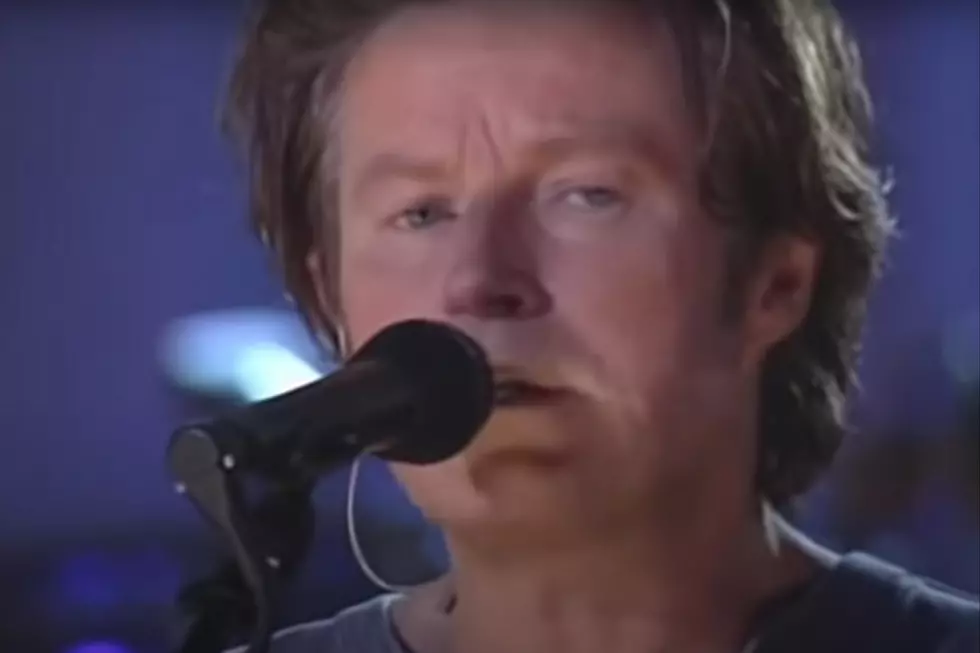
How Don Henley Reunited With Ex-Bandmate for Current Eagles Tour
Jim Ed Norman has spent a lifetime in the music business, working as a producer and A&R man, eventually finding his way to the top where he became president of Warner Music Nashville.
So what’s he doing out on the road with the Eagles, conducting the 70 piece orchestra and choir on the current Hotel California tour?
Well, it’s the culmination of a 50-year relationship with the California band, one which took root in Texas a few years prior to that. It was a warm day as Norman walked the campus of North Texas State University. He heard the sounds of Led Zeppelin filtering out of one of the apartment doors. Inside, he held out an album by the Dillards and said, “Hey, you need to check this out.” The recipient was Don Henley and as Norman laughs, “The rest was geography.”
Henley and Norman wound up in the same band, Shiloh. They issued a single self-titled album in 1970, produced by Kenny Rogers, then split in 1971 as Eagles began to take shape. Henley wouldn’t forget his former bandmate. As shared in the following interview, Norman received a phone call just a couple of years later that would alter the course of his future career in a big way.
Starting with the Desperado album in 1973 and culminating in his work on Hotel California in 1976, Norman became the arranger and piano player for the Eagles. He stayed in the fold in the years that followed, helping to produce and arrange Glenn Frey’s No Fun Aloud in 1981.
Norman's latest tour of duty brings his history with Henley and the Eagles full circle. He recently spoke with UCR via Zoom during a day off on the road.
How did you end up back in the Eagles mix for this Hotel California tour?
It was really Don – because Don and Glenn, quite frankly, gave me [my first shot. There were many] conversations I had with people about [how] I’m an arranger and want to be an arranger, and I want to be involved in this portion of the business. It wasn’t until Don and Glenn gave me that shot on “Desperado” [that it finally happened]. So “Desperado” became the first thing that I ever did. That imprimatur, if you will, made it possible. All of those people who I had been trying to convince [to] let me do some arranging, they were calling saying, “Oh, Jim Ed, we didn’t know you were an arranger. It was just that stamp of approval. [Then] Don called and said, "We're going to mount a Hotel California tour. We’re going to perform the album in its entirety.” Because of the role the orchestra played on that record, [they wanted to feature that element as part of the tour].
That’s great.
Because you’re a vinyl aficionado, if you remember, the record first came out and Side 1 ends with “Wasted Time.” You flip it over and I've been able to use the orchestral reprise of “Wasted Time” [that starts the second side] repeatedly in conversation with students through the years at universities across the countries when I’ve spoken, as a reminder, always do more than you’re asked to do. I was only expected to come in that day with what it is they’d asked me to do, but I had been so moved by “Wasted Time” and the melody and the beauty of it that I sat down and wrote this piece. As the fates would have it, there was time left over after we got finished with what we needed to do that day for the other songs. I said, “Hey guys, I have this piece. Would you be interested in hearing it?” Of course, they wanted to hear it. Lo and behold, as a complete surprise to me, it ended up on the record as the reprise.
Listen to 'Wasted Time' by Eagles
It’s a signature part of the album.
Well, thank you for saying that. When that’s your ilk and your life and what it is that you enjoy doing, you never really know how people will respond to it. It’s been wonderful to hear the roar that comes from people when they hear it. Sometimes, it’s quite active; other times, it’s more sedate. I don’t want to overstate it by saying there’s an awe, but it’s like, “Oh my gosh, listen!” The orchestra has a moment. When first presented with the idea that they were going to do this [tour], essentially, it came down to, “Well, you can do all of it or none of it. You can redo the charts.” Here in Nashville at the Country Music Hall of Fame, they’re doing a tribute to Southern California country rock and interviewing tons of people that were a part of that period in Southern California history and time. As they interviewed me, they asked, “Do you have any memorabilia?” I said, “Yeah, I’ve got a couple of things” – one of which ends up being the original score, for instance, on “Desperado.” I have other original scores that go all the way back to 1973. Little did I know in 1973 that there would be a use for an old score, but as I pulled it out, it had chicken scratch and all kinds of notes.
That historical stuff is always so fun.
There would be one that would say “MSG,” Madison Square Garden. The guys had made a change in the way they were doing the end, let’s say. There was one that had Wembley on there, one that said the Forum. There were all of these notes throughout the score that are relevant to a particular time or recording. That happened from ‘73 until Hotel California got [played] live and then that was the end of it. So it was, “Jim Ed, you can help get charts together and then come conduct it, if you want” – because at the time, I was working here in the business, back in the record industry, working A&R and producing and what have you. The fact is, my fiancee encouraged me and said, “You really need to do this.” I demurred on the front end. Somebody recently when we were on the road, one of the orchestras, we were talking about conducting [and] having written all of the parts, that’s also something – because when they see “arranged by,” a lot of times, they don’t know that I’m the guy who arranged or wrote the part initially.
That’s understandable, I guess.
There’s [also] those that grew up at times, with the Eagles. There’s respect that comes [with being a conductor] and I always have to apologize. I was telling them that I became a conductor the day we recorded “Desperado,” the first thing I ever did. Going into the studio, Glyn Johns and I go back into the record room. I said to him, “Hey Glyn, I notice they’ve got the chairs out there for the orchestra and two microphones. Nobody has any headphones.” All of the dates I’d seen on television or been to live in Los Angeles, the orchestra had on headphones and they were recording. Glyn, in his inimitable way, says: “Well, yes, you’re going to conduct, aren’t you, mate?” I said, “Well, I guess I am.” I became a conductor in that moment, as well. I got the credit for arranging and conducting as a result. As I tell the orchestra that story occasionally when we chat, I say, this is such a moment that I can revel in – because it’s the song now that closes out the show, as part of the encore.
Listen to 'Desperado' by Eagles
I would imagine the whole thing is a real experience.
I get to actually hear parts that I wrote that I don’t hear as strongly or maybe even adequately in my mind, on the record. Glyn had two microphones and it was my job as the conductor to make sure I got out of the orchestra what needed to happen. Now, because I know those things, I’m able to conduct appropriately. I went from demurring about going on the road to being encouraged, and I realized [that it was something I needed to do]. I wake up one night and I can’t sleep and I’m sitting there going, “I’m never going to get to stand in front of a large orchestra conducting again.” It just doesn’t happen the same way. I mean, I don’t want to discount the possibility, but it was just unlikely that something like this was going to happen again. Initially, it was to go to Vegas. Then, a few dates [were added]. COVID shut everything down, like it did for all of us. We started back up again in the fall and continue on down to the end of May.
I don’t know to what extent there will be a decision to even continue further, but what it’s like is glorious for me – to stand in front of the orchestra. There are moments as I’m sitting there conducting, for a moment, I’m totally outside whatever it is I’m doing. There’s no thinking going on. I’m just absorbing. I’m actually a listener, as opposed to someone trying to make sure that things stay in the cracks, and that we keep up with the band and all of those responsibilities that one has. I’m fortunate also that I’ve got some great people that travel. The concertmaster, Erica Swindell; Kristine Kruta, the lead cellist; and Diane Louie, who is the librarian. Diane, quite frankly is a much better conductor than I am. I mean, she’s a legitimate conductor. She’s given her whole life to that, and is encouraging and so helpful. Then, we’ve got a great contractor, Marci Skolnick, who puts the musicians together everywhere we go.
Why do you think people hold the Hotel California album in such high regard?
Great songs. You know, I think maybe its commentary on the state of affairs at the time. It resonated. But I think it’s about the great songs. There's a famous quote now with [Jack] Nicholson being with Jackson [Browne] at a concert, and Jackson’s taking it in and he turns to him and says, “Repertoire.” [Laughs.] It runs throughout the gamut of what they’re about as creative people. But I think that [the LP] just amazing – and [it has] great performances. Everything on there is wonderful performances. There’s a song that Vince [Gill] sings in the show, “Try and Love Again.” I find at times that I’m sitting there grooving on that, maybe more than anything else just because of the pocket that it hits and what happens with it. It’s really good and yet it didn’t become a single. They moved on to other things.
Listen to 'Try and Love Again' by Eagles
The Best (and Worst) Song From Every Eagles Album
Six Little-Known Eagles 'Hotel California' Facts





